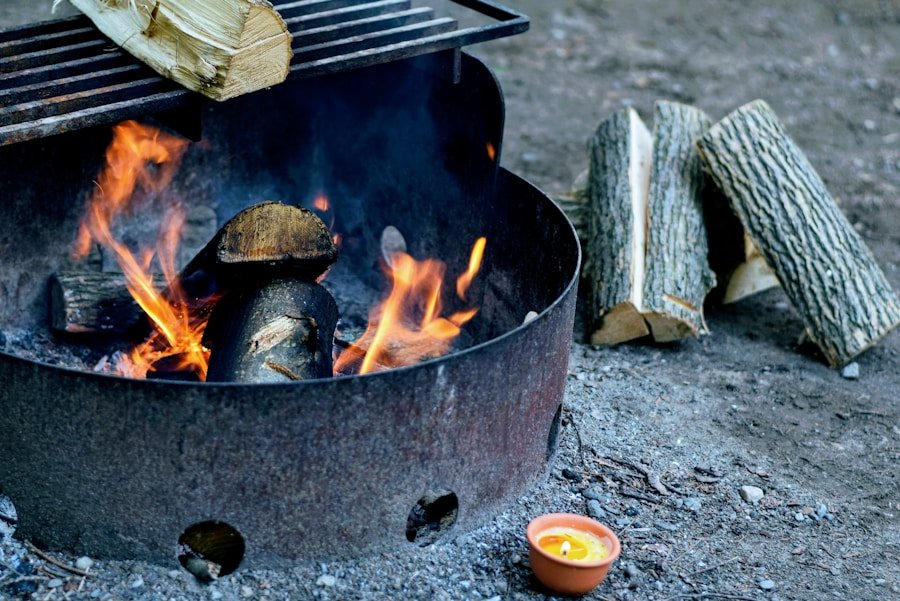When planning a camping trip, selecting the right stove for cooking is a crucial decision. While some campers prefer the traditional method of cooking over a campfire, others opt for the convenience of gas or electric camping stoves. Each option has its advantages and disadvantages, making it essential to weigh your needs and preferences before making a decision.
This article provides an in-depth examination of the benefits of campfire cooking, a comparison of gas and electric camping stoves, and a discussion of the key factors to consider when choosing the ideal stove for your outdoor adventures.
Key Takeaways
- Gas camping stoves offer convenience and quick cooking times, making them ideal for campers on the go.
- Electric camping stoves provide a more environmentally friendly option with no emissions and easy cleanup.
- When choosing a camping stove, consider factors such as fuel availability, cooking style, and environmental impact.
- Gas stoves are great for boiling water and cooking quickly, while electric stoves are better for simmering and slow cooking.
- Ultimately, the right choice for your camping adventures depends on your personal preferences and the specific needs of your trip.
The Benefits of Campfire Cooking
The Joys of Campfire Cooking
Campfire cooking allows you to connect with nature in a way that’s impossible with a gas or electric stove. It also forces you to slow down and be more mindful of your surroundings, which can be a welcome change from the hustle and bustle of everyday life. Additionally, cooking over a campfire can impart a unique flavor to your food that’s impossible to replicate with a stove. Whether you’re roasting marshmallows for s’mores or grilling up a hearty dinner, there’s something special about the taste of food cooked over an open flame.
The Challenges of Campfire Cooking
On the other hand, campfire cooking does have its drawbacks. It can be time-consuming and labor-intensive, requiring you to gather firewood, build and tend to the fire, and wait for it to reach the right temperature for cooking. In wet or windy conditions, it can also be challenging to get a fire started and keep it going.
Alternative Options
Additionally, some campsites have restrictions on open fires due to fire danger or environmental concerns, making campfire cooking impossible in certain areas. For these reasons, many campers opt for the convenience of a gas or electric camping stove.
Comparing Gas and Electric Camping Stoves
Gas and electric camping stoves each have their own set of advantages and disadvantages. Gas stoves are popular among campers for their portability, ease of use, and ability to quickly reach high temperatures. They come in a variety of sizes and styles, from compact single-burner models to larger multi-burner setups, making it easy to find one that suits your needs.
Gas stoves are also relatively inexpensive and widely available, making them a popular choice for budget-conscious campers. On the other hand, electric camping stoves offer a different set of benefits. They are typically more lightweight and compact than gas stoves, making them easier to transport and store.
They also tend to be more environmentally friendly, as they don’t produce any emissions during use. Additionally, electric stoves are often easier to clean and maintain than gas stoves, as they don’t require fuel canisters or regular maintenance of burners and valves. However, electric stoves do require access to a power source, which can be a limitation when camping in remote or off-grid locations.
Factors to Consider When Choosing a Camping Stove
| Stove Type | Pros | Cons |
|---|---|---|
| Gas Camping Stove | Quick heating, adjustable flame, works well in cold weather | Requires fuel canisters, can be bulky |
| Electric Camping Stove | Easy to use, no need for fuel canisters, lightweight | Requires access to electricity, slower heating |
When deciding between a gas or electric camping stove, there are several factors to consider. First and foremost, think about your camping style and the types of trips you typically take. If you tend to camp in established campgrounds with access to amenities like power outlets and picnic tables, an electric stove may be a convenient option.
On the other hand, if you prefer more remote or primitive camping experiences, a gas stove may be a better fit. Consider the size and weight of the stove as well, especially if you’ll be carrying it on backpacking trips or in a small vehicle. You’ll also want to think about the types of meals you typically prepare while camping and how the stove’s features (such as burner size and heat output) will impact your cooking experience.
Another important factor to consider is the environmental impact of your choice. Gas stoves produce emissions during use, contributing to air pollution and climate change. While they may be more convenient in some situations, it’s important to weigh this against the potential environmental harm.
Electric stoves, on the other hand, produce no emissions during use and are generally considered more eco-friendly. However, they do require access to a power source, which may not always be available in remote or off-grid camping locations.
The Convenience of Gas Camping Stoves
Gas camping stoves are known for their convenience and reliability. They are quick and easy to set up, requiring only a fuel canister and a match or lighter to get started. Once lit, they reach cooking temperature within minutes, allowing you to start preparing meals without delay.
Gas stoves also offer precise control over heat output, making it easy to simmer sauces or boil water with minimal effort. Many models feature built-in wind screens and adjustable legs for stability on uneven terrain, further enhancing their convenience and versatility. In addition to their ease of use, gas camping stoves are widely available and relatively affordable.
Fuel canisters can be purchased at outdoor retailers, hardware stores, and even some grocery stores, making it easy to stock up before a camping trip. Many campers appreciate the simplicity of gas stoves compared to other cooking methods, as they require minimal setup and cleanup while still providing a reliable source of heat for cooking.
The Advantages of Electric Camping Stoves
Environmental Friendliness
One of the biggest advantages of electric stoves is their eco-friendliness. Unlike gas stoves, which emit pollutants during use, electric stoves produce no pollution or greenhouse gases. This makes them a more sustainable choice for environmentally conscious campers who want to minimize their impact on the natural world.
Portability and Convenience
Electric stoves also tend to be more lightweight and compact than gas stoves, making them easier to transport and store. Many models are designed with backpackers and minimalist campers in mind, featuring foldable legs, nesting cookware sets, and other space-saving features.
Easy Maintenance
Additionally, electric stoves are often easier to clean and maintain than gas stoves, as they don’t require fuel canisters or regular maintenance of burners and valves.
When considering the environmental impact of gas vs. electric camping stoves, it’s important to weigh the emissions produced during use against the energy source required for operation. Gas stoves produce emissions such as carbon monoxide and nitrogen oxides during combustion, contributing to air pollution and climate change.
While modern gas stoves are designed to minimize these emissions through efficient combustion processes and catalytic converters, they still have an impact on the environment. Electric stoves, on the other hand, produce no emissions during use. However, they do require access to a power source in order to operate.
This means that their environmental impact is tied to the energy source used to generate electricity. If the electricity comes from renewable sources such as wind or solar power, then an electric stove can be considered a very environmentally friendly option. However, if the electricity comes from fossil fuels such as coal or natural gas, then an electric stove may have a larger environmental footprint than a gas stove.
Making the Right Choice for Your Camping Adventures
Ultimately, the decision between a gas or electric camping stove comes down to your personal preferences and camping style. If you value convenience, portability, and quick setup times, a gas stove may be the best option for you. On the other hand, if you prioritize environmental sustainability, ease of maintenance, and lightweight design, an electric stove may be more suitable.
It’s also worth considering that many campers choose to bring both types of stoves on their trips in order to have flexibility in different situations. For example, you might use a gas stove for quick meals or boiling water, while using an electric stove for more elaborate cooking projects or in areas where open flames are prohibited. In conclusion, both gas and electric camping stoves have their own set of benefits and drawbacks.
By carefully considering your needs and preferences, as well as the environmental impact of each option, you can make an informed decision that will enhance your camping adventures for years to come. Whether you prefer the rustic charm of campfire cooking or the convenience of modern stoves, there’s no shortage of options available to help you enjoy delicious meals in the great outdoors.
FAQs
What are the benefits of using a gas camping stove?
Gas camping stoves are popular for their quick and easy setup, as well as their ability to provide high heat output for cooking. They are also versatile and can be used in various weather conditions.
What are the advantages of using an electric camping stove?
Electric camping stoves are convenient for campers who have access to electricity at their campsite. They are also easy to use and maintain, and do not produce any emissions or odors during use.
What factors should I consider when choosing between a gas and electric camping stove?
When choosing between a gas and electric camping stove, consider factors such as the availability of fuel or electricity at your campsite, the type of cooking you plan to do, the weight and portability of the stove, and any safety concerns.
Are there any safety considerations when using a gas camping stove?
When using a gas camping stove, it is important to follow the manufacturer’s instructions for setup and operation, as well as to ensure proper ventilation to prevent carbon monoxide buildup. It is also important to check for gas leaks and to use the stove on a stable surface.
Are there any safety considerations when using an electric camping stove?
When using an electric camping stove, it is important to ensure that the stove is compatible with the electrical supply at your campsite and to use it in a safe and dry location. It is also important to follow the manufacturer’s instructions for setup and operation.













